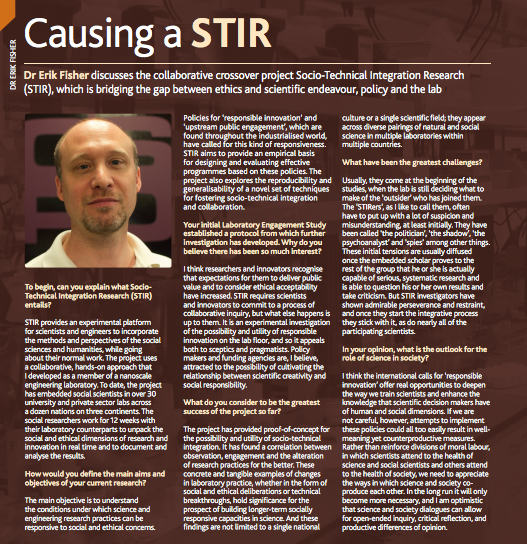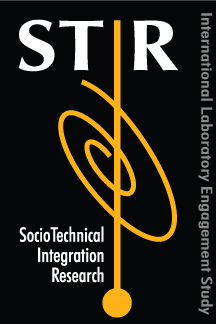You are here
Home › Research › RTTA 4: Integration & Reflexivity › RTTA 4/2: Laboratory Engagement Studies › Socio-Technical Integration Research (STIR)Socio-Technical Integration Research (STIR)
Science and technology policies around the world are placing new pressures on laboratories to address broader societal dimensions of their work in ways that have the potential to influence the content of science and engineering activities themselves – presumably for the better (Fisher and Mahajan, 2006).
Despite longstanding calls for collaborations between natural and human scientists to achieve this goal, neither the capacity of laboratories to respond to such pressures nor the role that interdisciplinary collaborations may play in enhancing responsiveness is well understood or empirically supported. It is crucial to overcome these limitations in order to design, implement and assess effective programs aimed at responsible innovation.
To address these limitations, the Socio-Technical Integration Research (STIR) project is conducting a coordinated set of 20 laboratory engagement studies to assess and compare the varying pressures on – and capacities for – laboratories to integrate broader societal considerations into their work. A core group of ten doctoral students each conduct two paired laboratory studies that extend more traditional ethnographies by engaging researchers in semi-structured interactions designed to enhance reflection upon research decisions in light of broader considerations.

Learn more about the STIR project.
"Initial results from STIR project field studies are in some cases strongly suggestive of both the possibility and the utility of conducting hands-on, lab-based socio-technical integration activities between social and natural scientists,” according to Erik Fisher, STIR PI.
Objectives
The objectives of the STIR project as a whole, as well as each paired study, are to:
- Identify and compare external expectations and demands for laboratories to engage in responsible innovation
- Assess and compare the current responsiveness of laboratory practices to these pressures
- Investigate and compare how interdisciplinary collaborations may assist in elucidating, enhancing or stimulating responsiveness
Doctoral students base their studies on a protocol developed by PI Fisher during a previous 33-month laboratory engagement study. This study provides preliminary evidence that such activities enable laboratory work to become more sensitive to its potential societal implications, without compromising laboratory research, education or strategic goals. The STIR project is investigating whether these results are applicable across a diverse and globally distributed range of labs and in a less time- and labor-intensive manner.
Intellectual Merit
The intellectual merit of the STIR project consists in its extension of the laboratory study as a basis for interdisciplinary collaborations; its timely and comparative investigation of emerging international pressures on research; its multi-sited investigation of the capacity for a diverse set of laboratories in 10 different countries to participate in responsible innovation; and the globally engaged and communal form of graduate education that it will pilot and for which it will establish a platform.
Broader Impacts
The STIR project:
- Trains a diverse and globally engaged cadre of doctoral students to observe and collaborate with scientists and engineers in order to participate in responsible innovation
- Tests and refines a set of techniques that will be made available to others for use in designing, conducting and assessing effective collaborations with scientists and engineers that are aimed at responsible innovation; includes developing a research and education platform that will allow the continued training and placement of additional and future researchers
- Strengthens linkages between science studies scholarship and science and technology policy deliberations by informing research, management and education policies that seek to institute interdisciplinary interactions aimed at responsible innovation
Support
The STIR project is co-funded through the NSF programs in Science, Technology & Society; Biology and Society; Mathematical and Physical Sciences and Society; Science of Science and Innovation Policy; and Office of International Science and Engineering. The project is administered through CNS-ASU.
How to STIR: Video Training Modules
To learn more about how to implement your own STIR project, click here.






